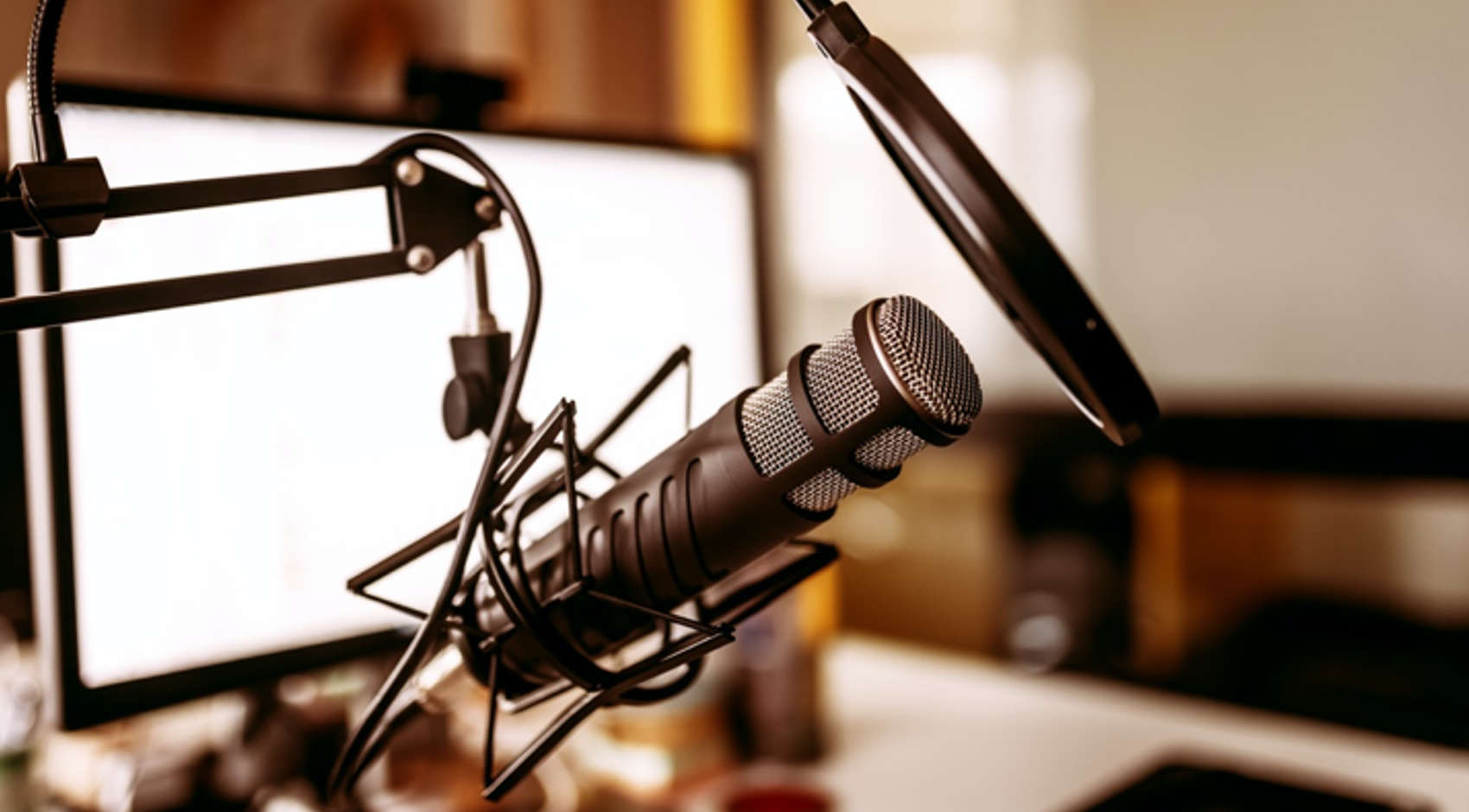You have something to say, but you think that a podcast as a medium is too elaborate? In fact, “radio on demand” is technically quickly implemented. It is more difficult to generate real reach and lasting attention with a podcast. We spoke to our Senior Content Manager Valeska Fuhlenbrok, who among other things designed and supervised the telekomnetz podcast.
Interview with Valeska Fuhlenbrok
Is the podcast still underestimated as a medium?
Valeska: Absolutely! In times of flat rates, smartphones, smart speakers and on-demand offerings, podcasts are becoming more and more popular. No matter whether it’s cleaning up, on the road or doing sports – more than a quarter of Germans now listen to podcasts. And the number is growing every year. The range of topics is very diverse, from current news to film, science or comedy. Some formats broadcast daily, others weekly, monthly or even irregularly.
What is your experience – how often should you go live with a new episode?
That depends of course on the subject. Logically, Deutschlandfunk’s podcast “Der Tag” must appear once a working day, while a technology-based format such as “TelekomNetz” – our latest podcast project – can go live on a weekly basis. In general, it is important to publish regularly, also for the algorithm of the individual distributors.

In her private life Valeska listens to the podcasts
„Kunst und Leben“ oder „Deutschlandfunk – Der Tag“ regularly
What is the bouncerate / timespend for podcasts?
I don’t know of any other medium where the users stay with it for such a long period of time. The numbers prove: If you don’t get off in the first two minutes, you stay on until the credits roll. In numbers that is nearly 90 % of the listeners.
That proves it: In contrast to video platforms such as YouTube or social networks, podcasts don’t just click through and skim through quickly. The podcast recipients consciously decide on an episode or format and often stay with it until the end. Of course, the format concept must be right.
Many companies do not yet have podcast on the radar. Why?
Some people still underestimate the concept of podcasting and like to compare it to classic radio, although listener numbers and interest have increased, especially in the last five years. This gives companies in particular the opportunity to strengthen their own brand and build up a long-lasting customer relationship. Because the Podcast offers basically three large advantage:
- Informative and entertaining content has a longer lasting effect than mere advertising
- The audio format can be played practically everywhere and on the side
- Podcasts and thus also the company are heard in the private environment
Where does the trend podcast actually come from?
The USA are currently the world leader in podcasting and are 2-3 years ahead of us Germans. The hype started with the most successful podcast to date, “Serial”, which deals with unsolved criminal cases. In 2018, it has already recorded more than 350 million downloads.
What hardly anyone knows is that numerous US-American podcasts from various sectors generate annual sales of several million dollars. This wave of success has also spilled over to Germany in recent years.
But as already mentioned, the actual podcast trend arose at about the same time as the market launch of smartphones. Suddenly, on-demand services were in demand and podcasts were able to establish themselves more and more. Finally, the flat-rate tariffs in mobile telephony additionally favoured the location-independent availability of such formats.
Is there the typical podcast listener?
Young people in particular enjoy listening to podcasts in this country. 58 percent of 16 to 34-year-olds and still 38 percent of 35-54 year-olds in Germany can get enthusiastic about them. The typical German podcast listener is an early adopter with a sense for mobile technologies, an affinity for brands, quality-conscious and 20 to 39 years old. In terms of gender, there is no significant difference between the listeners – 52 percent are male, 48 percent female. German podcast listeners have a high level of education and purchasing power.
Are there trend themes in podcasts?
Looking at the most successful podcasts on the largest platforms Spotify and iTunes, the picture is relatively homogeneous. Crime, talk, comedy, news and political formats are particularly popular. However, we still see considerable potential in the IT, technology, health and medical sectors.
Are company podcasts an effective marketing tool?
Yes, many of the most successful podcasts are made by celebrities or media houses already known. But companies now also have very good prospects of reaching a wide audience with podcasts. It should not be about mainstream topics or their own brand. Companies should have the ambition to produce interesting content for niches with their own podcast. This enables them to reach a relevant target audience and turn them into loyal listeners in the long term.
For the B2C field, public figures and artists can be engaged as hosts, who can also implement their own ideas. One example is “Never heard – The podcast that gives you a voice” with actress Katjana Gerz, who invites guests with unusual hobbies, absurd voices or bizarre jobs. Behind this podcast is the brand GeloRevoice®, a throat pill from the manufacturer G. Pohl-Boskamp.
In the B2B sector, on the other hand, the focus is even more on topics related to the company’s own products. B2B podcasts are ideally suited for dealing with a topic in depth. In this way, you position yourself more strongly as a specialist in a particular field and attract the attention of potential business partners and customers. The podcast “Digitization. Simple. Do it.” from Deutsche Telekom is already producing its B2B format in its fifth season. The latest developments in digitization and technology will be examined in more detail.
How important is the concept behind a podcast format?
The concept and the right strategy are the be-all and end-all, just like any other successful marketing measure. When it comes to brainstorming and the subsequent conception of the podcast, companies must first clarify a few questions:
- What is the core topic of the podcast?
- Who is the target group?
- How is the podcast distributed? (according to seasons, episodes or main topics)
- What format should the podcast have? (Talk, interview, entertainment, fictional or knowledge format)
Whether B2B or B2C – it is not necessary to bring celebrities or influencers on board. What’s most important are good guests and even better hosts who shine with expert knowledge and really have something to tell.
I can only advise companies planning podcasts to contact a suitable partner. The effort behind a good concept based on analysis and strategy, production, distribution and finally marketing for good coverage is quickly underestimated.
How is The Digitale positioned in the podcast sector?
We have already developed several podcast concepts for well-known companies. The latest project is the TelekomNetz-Podcast, which deals with a wide range of projects related to network expansion: from 5G coverage at the Berlin Marathon to the dismantling of the last yellow phone booth in Germany. Highly emotional, spoken in talk format by the two press spokesmen Steffi Halle and Georg von Wagner.
Exciting here: We operate the very successful YouTube channel Telekom Netz for our customer, which shines precisely because of its simple and consistent appearance. The users feel close to the team, are taken along on their travels and get an insight into the everyday life of the press officers. We wanted to translate this authentic, non-perfect atmosphere into the podcast. Which, in my opinion, has turned out well.
How long must a podcast be?
The basic rule for the length of a podcast is: If the topic or a guest gives it away, an episode can last several hours. There should not be a time limit. Unless the format requires it. The online version of the weekly newspaper “Die Zeit”, for example, offers several podcast formats, including “Alles gesagt? Here, well-known personalities are interviewed until they themselves no longer feel like it. A few weeks ago, the youtuber Rezo managed to create an episode of 8 hours and 40 minutes.
How important is the quality of the podcast recording?
Here it depends on the demand on the format. A company that stands for premium products is expected to deliver the same quality at podcast level: finely differentiated sound tracks, a high-quality sound bed, clear sound and a warm atmosphere.
If first-class quality is not at the top of the prio list, a high-quality microphone is primarily important. The price for such a microphone can be as low as a few hundred euros and can be purchased in specialist shops or online. Apart from that, one of course needs a software for recording. Either the audio software Garageband or Audacity for PC users, already integrated in Mac computers, is suitable for this. Both programs are free of charge.
Whether it’s high-class equipment or basic equipment, the host’s voice and authenticity are even more important than the technology. The host must have a certain “audio charisma” to keep listeners happy. In the end, the host’s voice and sympathy is what makes or breaks every podcast. No matter how good the concept may be.
Where and how often do I publish my podcast?
The distribution of the podcast is done in the following four steps:
- Upload to the podcast hosting provider (example: Podigee)
- Distribution via RSS feed
- Downloads via Podcatcher (Spotify, iTunes & Co.)
- Analysis of listener data
What else do I have to look out for – is there podcast SEO?
Sure! Here, too, it is important to always provide the individual episodes with all metadata, on the one hand to provide a good first insight for the listeners and on the other hand to be found more easily by search algorithms.
We support you in the planning and implementation of your podcast
Sources:




